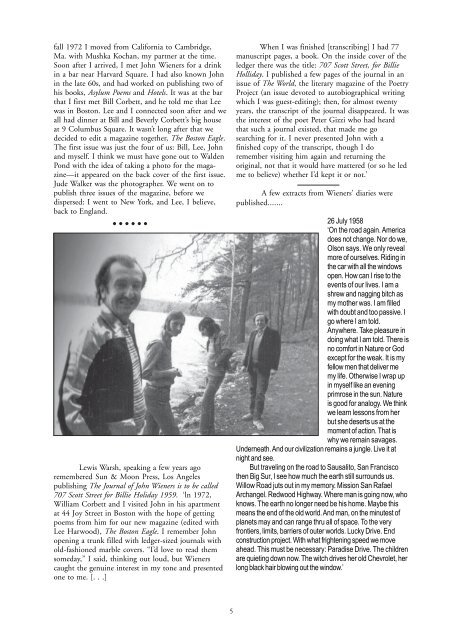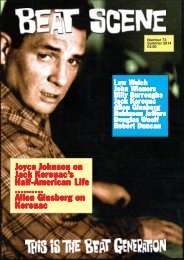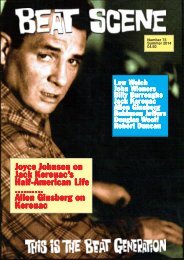You also want an ePaper? Increase the reach of your titles
YUMPU automatically turns print PDFs into web optimized ePapers that Google loves.
fall 1972 I moved from California to Cambridge,<br />
Ma. with Mushka Kochan, my partner at the time.<br />
Soon after I arrived, I met John Wieners for a drink<br />
in a bar near Harvard Square. I had also known John<br />
in the late 60s, and had worked on publishing two of<br />
his books, Asylum Poems and Hotels. It was at the bar<br />
that I first met Bill Corbett, and he told me that Lee<br />
was in Boston. Lee and I connected soon after and we<br />
all had dinner at Bill and Beverly Corbett’s big house<br />
at 9 Columbus Square. It wasn’t long after that we<br />
decided to edit a magazine together, The Boston Eagle.<br />
The first issue was just the four of us: Bill, Lee, John<br />
and myself. I think we must have gone out to Walden<br />
Pond with the idea of taking a photo for the magazine—it<br />
appeared on the back cover of the first issue.<br />
Jude Walker was the photographer. We went on to<br />
publish three issues of the magazine, before we<br />
dispersed: I went to New York, and Lee, I believe,<br />
back to England.<br />
○ ○ ○ ○ ○ ○<br />
Lewis Warsh, speaking a few years ago<br />
remembered Sun & Moon Press, Los Angeles<br />
publishing The Journal of John Wieners is to be called<br />
707 Scott Street for Billie Holiday 1959. ‘ln 1972,<br />
William Corbett and I visited John in his apartment<br />
at 44 Joy Street in Boston with the hope of getting<br />
poems from him for our new magazine (edited with<br />
Lee Harwood), The Boston Eagle. I remember John<br />
opening a trunk filled with ledger-sized journals with<br />
old-fashioned marble covers. “I’d love to read them<br />
someday,” I said, thinking out loud, but Wieners<br />
caught the genuine interest in my tone and presented<br />
one to me. [. . .]<br />
When I was finished [transcribing] I had 77<br />
manuscript pages, a book. On the inside cover of the<br />
ledger there was the title: 707 Scott Street, for Billie<br />
Holliday. I published a few pages of the journal in an<br />
issue of The World, the literary magazine of the Poetry<br />
Project (an issue devoted to autobiographical writing<br />
which I was guest-editing); then, for almost twenty<br />
years, the transcript of the journal disappeared. It was<br />
the interest of the poet Peter Gizzi who had heard<br />
that such a journal existed, that made me go<br />
searching for it. I never presented John with a<br />
finished copy of the transcript, though I do<br />
remember visiting him again and returning the<br />
original, not that it would have mattered (or so he led<br />
me to believe) whether I’d kept it or not.’<br />
A few extracts from Wieners’ diaries were<br />
published.......<br />
26 July 1958<br />
‘On the road again. America<br />
does not change. Nor do we,<br />
Olson says. We only reveal<br />
more of ourselves. Riding in<br />
the car with all the windows<br />
open. How can I rise to the<br />
events of our lives. I am a<br />
shrew and nagging bitch as<br />
my mother was. I am filled<br />
with doubt and too passive. I<br />
go where I am told.<br />
Anywhere. Take pleasure in<br />
doing what I am told. There is<br />
no comfort in Nature or God<br />
except for the weak. It is my<br />
fellow men that deliver me<br />
my life. Otherwise I wrap up<br />
in myself like an evening<br />
primrose in the sun. Nature<br />
is good for analogy. We think<br />
we learn lessons from her<br />
but she deserts us at the<br />
moment of action. That is<br />
why we remain savages.<br />
Underneath. And our civilization remains a jungle. Live it at<br />
night and see.<br />
But traveling on the road to Sausalito, San Francisco<br />
then Big Sur, I see how much the earth still surrounds us.<br />
Willow Road juts out in my memory. Mission San Rafael<br />
Archangel. Redwood Highway. Where man is going now, who<br />
knows. The earth no longer need be his home. Maybe this<br />
means the end of the old world. And man, on the minutest of<br />
planets may and can range thru all of space. To the very<br />
frontiers, limits, barriers of outer worlds. Lucky Drive. End<br />
construction project. With what frightening speed we move<br />
ahead. This must be necessary: Paradise Drive. The children<br />
are quieting down now. The witch drives her old Chevrolet, her<br />
long black hair blowing out the window.’<br />
5





